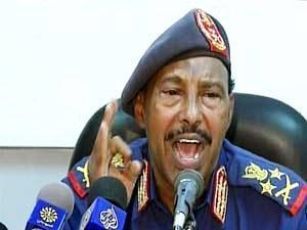North Sudan’s defense minister threatens South with military intervention
April 20, 2011 (KHARTOUM) – North Sudan’s Defense Minister Abdel Rahim Mohamed Hussein has threatened to take military action against South Sudan in order to stop its alleged support to rebels from the western region of Darfur.

However, the veteran figure at the northern government threatened that military intervention in the south remains “a secondary option” if the region’s government does not stop what he alleged was its support to Darfur rebel groups.
“Take your hands off Darfur and expel the rebels,” Hussein warned the south.
Sudan’s President Al-Bashir on Tuesday echoed claims that the south was providing support to Darfur rebels, urging the region’s government to refrain from such action, as reported by the country’s official news agency SUNA.
Al-Bashir also warned, in an interview published on Wednesday by the Guardian that south Sudan could become a failed state if issues of divisions and corruption are not quickly addressed.
Similarly, South Sudan has been accusing the northern government of supporting militias and defected army generals in its territories with the intent of destabilizing the region ahead of the declaration of its independence in July.
Last month South Sudan government produced documents showing orders being given by the northern army for the supply of arms to armed groups in the south, but the north alleged that the documents are forged.
North Sudanese officials have routinely accused the south of supporting and giving sanctuary to Darfur rebels, pointing to the presence in the region of Minni Arkoi Minnawi, the leader of a former Darfur rebel faction who defected from the government after he signed a peace deal with Khartoum in 2006.
The conflict in Sudan’s western region of Darfur erupted eight years ago when rebel groups belonging mostly to African ethnicities took up arms against the central government, accusing it of marginalizing the region. According to UN figures, 300,000 people died and 2.7 millions lost their homes as a result of the conflict.
Hussein iterated claims that the troubles in Darfur region were exaggerated by the West in order to give a negative impression about the situation there.
“The problem is that the Western nations are the ones who insist there is a problem,” he said.
Separately, the country’s top military official said that Sudan’s shared borders with Libya, which has been fractured by an armed rebellion against the rule of its leader Muammar Qaddafi, were being closely monitored in order to prevent leakage of weapons into Sudan. “We can control the deserts to a large extent,” he said.
The minister also claimed the existence of cooperation between the Libyan authorities and Darfur rebel group the Justice and Equality Movement (JEM), whose leader Khalil Ibrahim fled to Libya after his erstwhile allies in Chad refused to allow him entry to the country following a thaw in previously-strained ties with Sudan.
According to Hussein, the revolutionaries in Libya found a JEM camp in Al-Kafrah.
In response to calls for his resignation against the background of an Israeli airstrike which incinerated a car in eastern Sudan earlier this month and killed two people, the minister said he was confident that he was doing his job properly.
He revealed that military reinforcements in Port Sudan and Sawakin, two towns in eastern Sudan, were being increased and that a review of military measures in the region was underway.
It was reported earlier this week that the Sudanese authorities had arrested an unknown number of people on charges of spying for Israel and providing information that facilitated the airstrike.
(ST)
